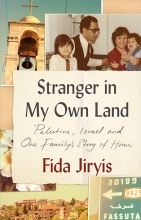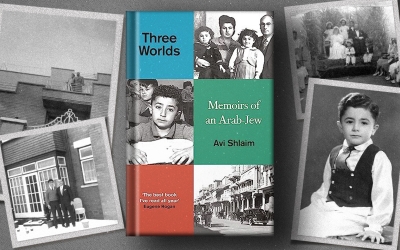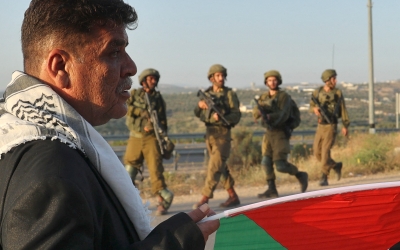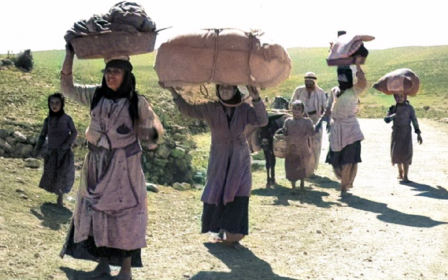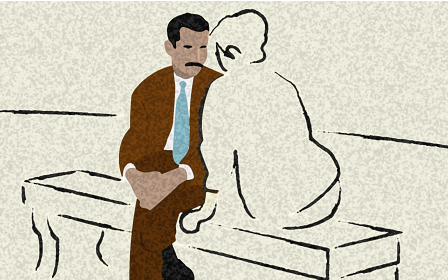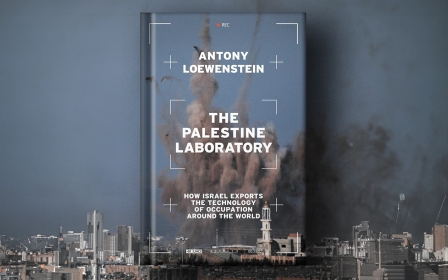Stranger in My Own Land: One Palestinian's bittersweet journey 'home'

The catastrophic impact of defeat and dispersal by the Israelis in 1948 lends Palestinian history a unique quality.
Palestinian society shattered into a thousand fragments. The trajectory of each one of them thereafter was different.
The story Fida Jiryis and her family represents is one very distinct strand - that of the minority who were not expelled in 1948.
Indeed they were part of that even smaller minority that was not displaced internally either but remained in their home - the beautiful, Christian village of Fassouta, a few miles from the Lebanese border.
But their experience was still traumatic.
Stay informed with MEE's newsletters
Sign up to get the latest alerts, insights and analysis, starting with Turkey Unpacked
Skilfully interweaving the personal and the political, the book divides into two parts. The first is the story of the author’s parents. The second her own.
Discrimination and dispossession
Jiryis paints a vivid portrait of life for Palestinians in Israel in the 1950s and 1960s.
Many Israelis remember it as a halcyon time. For Palestinians, it was an era of military rule, discrimination, and dispossession.
Their surviving communities were ever more tightly hemmed in by new Jewish settlements. And, in a cruel irony, thousands of Palestinians were obliged to find work on building sites, providing the muscle that built the new state.
To move around they were required to navigate a complex system of permits that was strikingly similar to the so-called "pass laws" operating in South Africa at the same time.
The experience of the author’s father, Sabri Jiryis, in many ways, parallels that of Nelson Mandela.
Born into a farming family, he became a lawyer and in 1959 was part of a small group that formed al-Ard ("the Land"), an organisation that sought to campaign for Palestinian rights within the structures of the Israeli state.
“One of al-Ard’s obvious mistakes was to trust in Israeli justice and democracy,” he wrote later. “Another was to underestimate the Zionist concept of ‘security’ and how widely it could be interpreted when convenient.”
Peaceful resistance proved futile. And after the Israeli seizure of the West Bank and Gaza in 1967, he gravitated toward the PLO. Subject to frequent house arrest and detention, he fled Israel in 1970 with his young wife, Hanneh. They settled in Beirut, where the author was born in 1973.
There Sabri Jiryis rose to become a director of the Palestine Research Centre, which sought to preserve Palestinian records and culture in the diaspora.
Almost unbearable pain
Shining through these pages is the immense power of human relationships to act as a balm, a partial healing for the emotional traumas inflicted by savage political repression.
But even this comes at a cost. As the Queen said at the 9/11 memorial: “Grief is the price we pay for love.” Again and again, we are confronted by the agony of relatives separated at times of birth, illness, and death.
Although they lived just a couple of hours’ drive away, the author’s parents had no postal or phone link with their families in Fassouta. Contact was only restored when a priest agreed to smuggle letters across the border.
At the core of the narrative is the murder of the author’s mother, along with 27 others, in a car bomb attack on the Palestine Research Centre by the Israeli-backed Christian Falange following Israel’s 1982 invasion of Lebanon. Her father escaped only by chance.
It’s clear that, even at a distance of 40 years, the pain remains almost unbearable.
After that the family moved to Cyprus, only to be uprooted again when the Israelis and Palestinians began peace talks in the early 1990s.
By now the author’s father was a close adviser to Yasser Arafat. The author paints a fascinating portrait of the Palestinian leader - “a patriot, gangster, dreamer, genius, con artist, fighter and man of peace, all in one.”
Sabri Jiryis was among the first to advocate for a two-state solution. He would also be a critic of Arafat’s ultimately futile compromises with the Israelis in the 1990s. Nevertheless, the family was among the tiny number granted the right to return home as part of the peace accords.
In 1995, Fida Jiryis set foot in Israel for the first time, at the age of 22. It seemed a “miracle”, she writes, and she spent days almost in a trance meeting extended family in Fassouta, many for the first time.
'No dogs, no Arabs'
But the cold reality that soon dawned is captured in the book’s title. Integrating into a small, conservative community was inevitably difficult. More challenging was the racism and discrimination of broader Israeli society.
“No dogs, no Arabs” reads a sign she encountered while looking for an apartment to rent in the coastal town of Nahariya.
'You’re so beautiful, one would never think you were an Arab!' an assistant in a clothes shop cheerfully tells her
“You’re so beautiful, one would never think you were an Arab!” an assistant in a clothes shop cheerfully tells her.
The cruder restrictions of the 1950s have gone (transferred to the West Bank and Gaza). But if Israel at that time resembled apartheid South Africa, it’s now comparable to the Jim Crow south in the United States, immediately prior to the civil rights movement.
She learned Hebrew and managed to find work in the software sector. But often she was the only Palestinian in the office. She encountered ignorance and often outright hostility, particularly following the outbreak of the Second Intifada in 2000.
As Israeli forces assault Jenin in 2002 she had to endure two baseball-capped American colleagues chuckling to each other: “We’re creaming them, man. They don’t stand a chance!”
“In eight years in Israel,” she writes, “I… never felt happy, nor free.”
Effectively abandoned
She emigrated briefly to Canada but found herself irresistibly tugged back towards her family and her people, eventually returning to live in Ramallah on the West Bank, where she remains.
Here, despite the brutality of occupation, she finds at least a semblance of the emotionally and culturally fulfilling Palestinian life for which she yearns.
Written with disarming simplicity, Stranger in My Own Land, is a valuable contribution to the rich canon of Palestinian memoir.
It concludes defiantly with the words of the Tunisian poet, Abu Qasem al-Shabbi: “The night will end, and the chains will be broken.”
As ever, one is struck by the sheer resilience of the Palestinian people. But it’s hard to avoid a feeling of bleak pessimism at the end.
Uniquely, Palestinians have been effectively abandoned by those who are normally the key allies of people fighting anti-racist struggles for freedom and self-determination: western liberals.
Hand-ringing platitudes aside, all too often they appear prepared to buy into narratives that demonise and disempower the Palestinian struggle, granting licence to Israeli repression and leaving Palestinians with no clear path forward.
Jiryis describes the experience of Moussa Assi, a friend of her father’s, detained for eight years by the Israelis in the 1970s.
“Israeli intelligence used extremely cruel methods of interrogation,” she writes. “One was the intense shaking of a person until his brain suffered temporary damage and he began to hallucinate.”
Released in 1978, Assi lived until 2012. But “he had lost any awareness of himself or those around him, and died without knowing who or where he was”.
It seems an apt metaphor for the treatment of the Palestinian people as a whole.
The views expressed in this article belong to the author and do not necessarily reflect the editorial policy of Middle East Eye.
Middle East Eye delivers independent and unrivalled coverage and analysis of the Middle East, North Africa and beyond. To learn more about republishing this content and the associated fees, please fill out this form. More about MEE can be found here.



